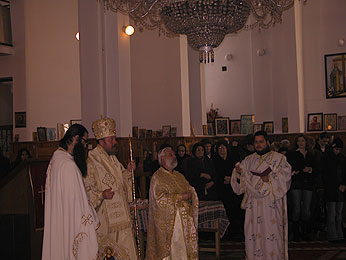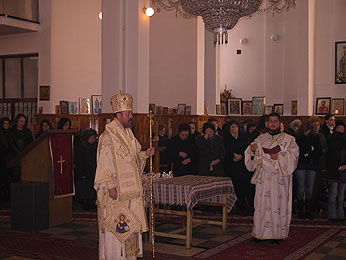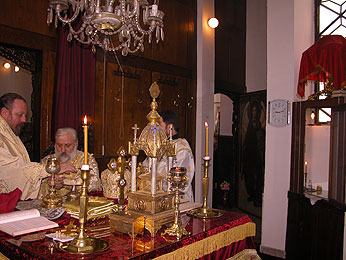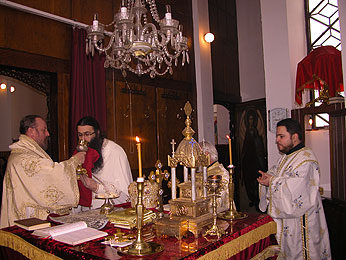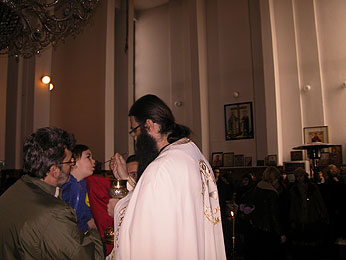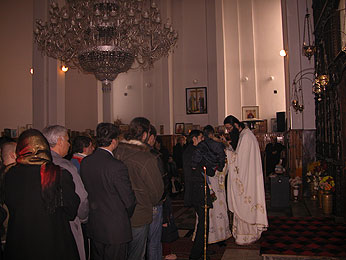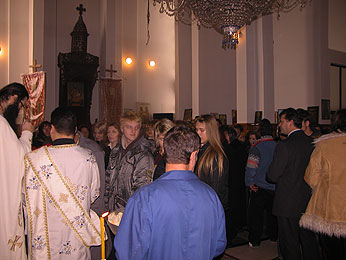Union by Essence, Union by Hypostasis, and Union by Energy ( 19.01.2008 )
Today, on the feast of Theophany, in the monastery of the Holy Fifteen Мartyrs of Tiberiopolis in Strumica, Metropolitan of Strumica Nahum celebrated Divine Liturgy.
Then Jesus came from Galilee to John at the Jordan to be baptized by him. And John tried to prevent Him, saying, “I need to be baptized by You, and are You coming to me?”
But Jesus answered and said to him, “Permit it to be so now, for thus it is fitting for us to fulfill all righteousness.” Then he allowed Him.
When He had been baptized, Jesus came up immediately from the water; and behold, the heavens were opened to Him, and He saw the Spirit of God descending like a dove and alighting upon Him. And suddenly a voice came from heaven, saying, “This is My beloved Son, in whom I am well pleased.” (Matt. 3:13-17)
Saint Cyril of Jerusalem says: “The beginning of the world is water, the beginning of the Gospel is the Jordan. When Jesus Christ was baptized in the Jordan waters, to the world was revealed that mystery which in the Old Testament had only been heralded, about which in Egypt and India had been spoken solely in fables: the mystery of the Divine Trinity. The Father made Himself manifest to the sense of hearing, the Spirit to the sense of sight, and the Son even to the sense of touch. The Father spoke His testimony about the Son, the Son was baptized in the water, and the Holy Spirit in the form of a dove was soaring above the water.” During the Baptism of the Godman Jesus Christ, God for the first time clearly and finally manifested Himself as Holy Trinity—Father, Son, and Holy Spirit. Hence, we have grounds for talking about pure theology i.e. Triadology i.e. about the Hypostases of the Holy Trinity and about the relations between Them from before ages, also about the union by Essence. We likewise have the reason to talk about Divine Dispensation (Economy), about the creation and salvation of the world and man—by the Father, through the Son, in the Holy Spirit. Within the frames of this, we also have the motive to talk about Christology and about union by Hypostasis. The Holy Apostle Paul says, “we speak wisdom among those who are mature” (1 Cor. 2:6); we will therefore adapt our sermon regarding both our abilities and the receptiveness of them who are listening to us, and we will talk about union by Divine energy and about the preparation for that union.
Christ is He Who saves us, first of all with His Person, as Godman, and as such with all His divine-human and saving deeds and events of His life: with His nativity, baptism, transfiguration, crucifixion, death, resurrection, ascension, and with the descent (sending down) of the Holy Spirit. Therefore does the entire Divine Dispensation of man’s salvation, accomplished in the Godman Jesus Christ, have soteriological (saving) character and meaning, and the term “salvation” is a basic notion in Orthodox spiritual life.
Nevertheless, let us not forget, the Godman Christ does not have any personal need of what He does, of the whole Dispensation of salvation, but He does it all only for us and our salvation. Namely, Christ has no need of baptism, for instance, but He does it solely for us and our salvation. According to Saint Gregory Palamas: “Union by hypostasis was accomplished in Christ. Therefore the human nature of Jesus in the hypostatic sense is one with the Logos; in it the divine energies, which have the Logos as their source, penetrate into the created nature and deify it.” In this lies the difference between Christ and Christians i.e. between hypostatic possession of divine life because of union by hypostasis—on the one hand, and deification through grace and participation because of union through energy, to which every man is called—on the other hand. This union by energy, in Christ, in His Body—the Church, becomes accessible to all who participate in the Holy Mysteries of the Holy Spirit. Thus Christ, with His Baptism, established the Holy Mystery of Baptism, sanctified the waters of the Jordan and even sanctified John the Baptist himself, who baptized Him.
Baptism and Chrismation in the Orthodox Church are performed together, one after the other. Holy Eucharist is at the same time the aim, the seal, and the fulfilment of Baptism and Chrismation. Holy Baptism is putting on Christ Himself (For as many of you as were baptized into Christ have put on Christ—Gal. 3:27), at which all the baptized as members unite in one Christ Jesus (Gal. 3:28), that is, in one Body, the Head of which is Christ and all the members are at the same time His and (individually) members to one another (1 Cor. 12:27). “Baptism,” Saint Nicholas Cabasilas writes, “is nothing but birth for Christ and receiving our true being and our true nature. The day of baptism becomes a nameday for the Christians, since then they are formed and shaped, and our formless and indefinite life takes form and definability.” Baptism in Christ is participation in His death and resurrection through the triple total immersion in water and renewal of our nature, that is, crucifixion of our old man with Him, so that the body of sin might be done away with and we could walk in newness of life (cf. Rom. 6:4-11).
Participation in the Holy Mystery of Chrismation is revival of every member individually through receiving the seal of the gift of the Holy Spirit i.e. through reception of uncreated grace and participation of all the faithful in the communion of the One Spirit. In this manner the Church i.e. all the faithful become one body and one Spirit (Eph. 4:4). The receiving of the seal of the gift of the Holy Spirit explains the evangelical putting new wine into new wineskins (Matt. 9:17). Through the Holy Mysteries of Baptism and Chrismation man receives the new life, he receives the fullness of God’s grace in his heart. The kingdom of God is within you (Luke 17:21). The one baptized receives the Gift-giver and Gift-bearer Himself, the Lord Holy Spirit, the Spirit of adoption, Who with ineffable sighs from within his heart cries out, “Abba, Father!” (Rom. 8:15). The biune Holy Mystery of Baptism and Chrismation, as we underlined above, is fulfilled and sealed with the receiving of the Body and Blood of Christ on the part of the newly baptized.
Holy Baptism is also called Holy Illumination. Why? It is so because the essence of the catechumens’ preparation for Holy Baptism, which could last even up to three years, is that in this period they be instructed how to purify their heart from the passions and how to fortify themselves in that science of sciences and art of arts. Consequently, along with Baptism they could also receive the gift of illumination and the mind-and-heart prayer. Thus, new wine is not put into old wineskins. In the first period of persecutions against the Church, the receiving of these gifts was under less strict conditions for those who desired to be baptized among else also due to the fact that they simultaneously embraced the danger to become martyrs, too.
The receiving of the gift of Great Schema or Great Angelic Habit is also called Illumination. Why? Because the essence of the preparation for receiving the Great Schema of the novices or rasophore monks, which lasts around three years, is that in this period they be instructed how to purify their heart from the passions and pray in it and how to fortify themselves in that science of sciences and art of arts. Consequently, along with the Great Schema they can also receive the gift of illumination and the mind-and-heart prayer. Hence, new wine is not put into old wineskins. Receiving of these gifts is under less strict conditions for them who desire to be tonsured into the Great Schema among other things also because of the fact that at the same time they offer their entire life to Christ and become martyrs by conscience.
All who have entered the spiritual age of illumination can preach publicly with a word about Christ and about the mysteries of the Kingdom; whereas, he who is still at the spiritual age degree of purification of the heart from the passions can confess Christ and the Kingdom he is waiting to come only with humility, with absolute obedience, and with silence.
Do we not see all this in Christ’s example as well? The Godman Jesus Christ until the age of thirty was anonymous and was obedient to His parents, although He could have performed all the miracles and preaching since His earliest youth. Only after His Baptism and the sign of the Holy Spirit in the form of a dove and the opening of the heavens for human nature and the confirmation by the Father does the Godman Christ set out to preach. And, He does all this for our instruction. In the present day, without the gift of mind-and-heart prayer and without illumination of the mind and without but a little knowledge of the mysteries of the Heavenly Kingdom, we judge and condemn so easily, preach so easily, discuss so easily on subjects that are beyond our place in the Church and our spiritual knowledge, and we so easily and with arrogance correct the people we think have erred—occurrences that make every normal man wonder. Do we not close thus the road to our heart and to the Heavenly Kingdom once and for all? Let us watch out, there is a scheme of things, particularly in Orthodox spiritual life!
Saint Gregory the Theologian asks, “What should we know, what should we learn [from Jesus’ Baptism]?”; and answers, “That we must first purify ourselves, and think humbly, and preach in the perfection of both spiritual and physical age. The first thing refers to them who decide to get baptized and are neither prepared nor do they fortify their redemption through the acquired habit of doing good. For, if the gift of grace—and it is a gift of grace!—grants absolution of past sins, then it [purification] is even worthier of respect, so that we do not return to our own vomit. The second thing refers to them who exult themselves above the stewards of the Holy Mysteries, if some dignifying position makes them distinguished. The third thing refers to them who take courage in their youth [and learning], so they consider any time to be a good opportunity to teach others or to preside [over others]. Jesus is purified, and you despise purification? He receives it from John, and you go against your spiritual father. He is at the age of thirty, and you, still beardless, teach the elders—or think that you teach them—while neither with your [spiritual] age nor with any manner of your behavior do you deserve respect…”
The same Father, in his sermon on Holy Illumination (Theophany), speaks about Baptism in blood and about Baptism in tears. If the first seems terrifying to us, who prevents us from the second? Saint Ignatius Brianchaninov in his works has a whole chapter on how we should force ourselves to tears, mourning, and repentance in order to renew the soul’s white vestment, darkened by delusion and sins after Holy Baptism.
